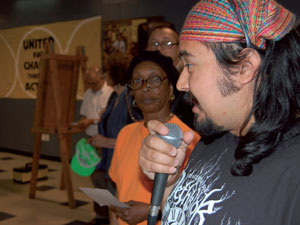By Charlene Muhammad CHARLENEM

LOS ANGELES (FinalCall.com) – A grassroots coalition is demanding that the Los Angeles Police Department (LAPD) rescind policies which activists say give officers broad powers to spy on people.
The Stop LAPD Spying Coalition spearheads the Campaign to Rescind Special Order 11 and its revised version, Special Order 1. Through Special Order 11, former Chief William Bratton implemented the Suspicious Activity Reporting (SAR) in March 2008, which made it policy to gather, record, analyze and report criminal and non-criminal “suspicious” activity or intentions potentially related to terrorism.
“A lot of these policies are guised under the fear of others…And now we with Islamophobia, the face of the boogie man is the Muslim but the campaign has brought home what the underlying intent is and how it affects all of us,” said Hamid Khan, a Soros Justice Fellow, who works on the Campaign to Stop LAPD Spying, which operates out of the Los Angeles County Community Action Network.
According to Mr. Khan, the orders represent more criminalization of residents, unlimited police powers, and shifting language. What’s at stake is the fundamental issue of the LAPD taking the power the state has for granted and people realizing that they have power, too in the form of lobbying and strong resistance, Mr. Khan told The Final Call.
Through the local effort, a coalition including national and youth organizations mobilized against the threats they say the special orders pose to civil liberties. On January 1, 2012, the LAPD adopted Special Order 1 to include or provide for better protection to residents according to the groups’ privacy and civil liberties concerns, but activists say it does not.
On March 23, the South Central Neighborhood Council denounced the LAPD’s polices and on March 16, the campaign sent a letter to Chief Charlie Beck and Deputy Chief Michael Downing, commanding officer of the LAPD Counter-Terrorism and Special Operations Bureau, demanding the Department rescind the orders.
On March 3, a diverse gathering of 200 people attended the campaign’s first community town hall meeting, including youth, formerly incarcerated persons, lawyers, faith based organizations, and academics.
The Final Call reached out by phone and via email to the LAPD for a statement or interview regarding its response to the community’s concerns and the impact and effect of the SAR Program since implementation. Public Information Officer Cleon Joseph phoned back and replied, “At this time we’re researching the matter and have no comment on this at this time.”
Activists say part of the problem is hundreds of thousands of Los Angelenos engage in many of the non-criminal activities cited on the list of more than 40 suspicious behaviors by the LAPD, including taking photos, using binoculars, and taking notes.
In a March 2, 2012 letter to Chief Charlie Beck, national and local civil liberties groups indicated that LAPD 2010 data showed that reports on non-criminal behavior comprised a major portion of its SAR file.
The most common non-criminal activities reported were “test[ing] existing security measures” and “abandon[ing] suspicious package/item,” according to the document. Behind those activities were “pre-operational surveillance” and “tak[ing] pictures/video footage.”
The letter was endorsed by the American Civil Liberties Union, Council on American-Islamic Relations, Asian Pacific American Legal Center, Coalition for Humane Immigrant Rights of Los Angeles, the South Asian Network, and the Sikh American Legal Defense and Education Fund.
Community groups are concerned that through the programs, the LAPD is maintaining intelligence files on people that it has no reason to suspect of any criminal or terrorist conduct, the groups told Chief Beck. They continued that, “conflicts with both law and LAPD policies that bar the collection and maintenance of intelligence files, at least beyond the initial phase of an investigation, unless evidence provides reasonable suspicion to believe the target is involved in criminal activity.”
“At the expense of not sensationalizing this huge tragedy of Trayvon Martin’s murder, one of the policies that LAPD has as an extension of Special Order 1, which calls for observed or reported behavior … is iWatch, which calls upon neighbors and neighborhoods to look for suspicious people and suspicious behavior,” Mr. Khan said.
“When you draw these parallels, that legitimizes racial profiling, that legalizes violence, it creates a potential for violence against people who are considered suspicious, considered undesirable,” he added.
According to Mr. Khan, the campaign’s next steps include demanding that the LAPD Police Commission intervenes by holding public hearings on the issue. A long-term effort for the campaign is to lay the foundation to bring the conversation about surveillance, spying and infiltration into public forums.
“Otherwise, we keep on looking at it as a historical issue on Cointelpro and the Police Red Squads and this is an opportunity to look at this issue locally that affects everybody,” Mr. Khan said, referring in part to the FBI’s counterintelligence program.












